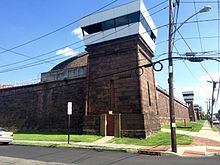New Jersey State Prison

Part of the 1832 "Fortress" portion of the prison, with modern modifications
|
|
| Coordinates | 40.207929, -74.755773 |
|---|---|
| Status | Operational |
| Security class | Maximum |
| Capacity | 1,819 |
| Population | 1,620 (as of January 1, 2016) |
| Opened | 1836 |
| Former name | Trenton State Prison |
| Managed by | State of New Jersey |
| Warden | Steven Johnson |
| Street address | Third and Federal Streets Trenton, NJ 08625 |
| Website | NJ Department of Corrections |
The New Jersey State Prison (NJSP), formerly known as Trenton State Prison, is a state men's prison in Trenton, New Jersey operated by the New Jersey Department of Corrections. It is the oldest prison in New Jersey and one of the oldest correctional facilities in the United States. It is the state’s only completely maximum security institution, housing the most difficult and/or dangerous male offenders in the inmate population. NJSP operates two security units and provides a high level of custodial supervision and control. Professional treatment services, such as education and social work, are a priority at the facility. The Bureau of State Use Industries operated the bedding and clothing shops that were once located in Shop Hall at the facility. These industries have been relocated to South Woods State Prison.
NJSP also housed New Jersey's men's death row until the state banned capital punishment in 2007. Its inmates include John Martini, who was condemned for the kidnapping and murder of a Bergen County businessman, and Jesse Timmendequas, who was sentenced to death for the rape and murder of 7-year-old Megan Kanka. This crime inspired the passing of Megan's Law, which requires communities to be notified when a convicted sex offender moves into their area.
New Jersey State Prison is a complex that consists of three separate but interconnected physical plants from three different eras of prison construction that took place on the property. The three sections are: The 1798 Penitentiary House; The 1832 Fortress Penitentiary; The 1982 Contemporary prison facility.
The 1798 NJ Penitentiary House, which was the first State Prison in New Jersey and the third in the nation after the Walnut Street Jail in Philadelphia and Newgate in New York City is also the oldest building still in operation as part of an active, working prison in the United States. This allows NJSP to lay claim to being the oldest continuously operating State Prison in the US. The only surviving portion of the 1798 Penitentiary House is the original Front House, which functioned originally as the living quarters for the Keeper of the State Prison, the four Assistant Keepers (The first 4 men who served in the capacity of what we know today as State Correction Officers), the Armory, administrative office space on the first floor and a row of cells for the confinement of disruptive prisoners in the basement. Since the Penitentiary House stopped housing prisoners within a few years after the 1832 Fortress Penitentiary opened, Auburn Correctional Facility can lay claim to having the oldest continuously operating cell house in the US.
...
Wikipedia
